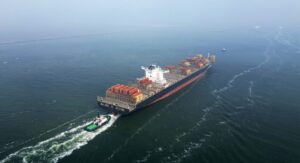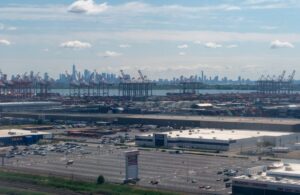Navis has released the findings from its 2021 Sustainability Survey, where it found that 93% of respondents believe it’s either important or extremely important for their organisations to have sustainability initiatives in place.
The survey gathered responses from over 71 Navis customers and highlights the interest that terminals have in moving towards more sustainable operations.

When asked what influenced the adoption of these sustainable initiatives, the top responders replied with examples such as complying with environmental regulations, aligning with organisational goals/values, making a tangible impact on the local/global environment, and meeting customer expectations.
Respondents also noted benefits for companies that are successful in these initiatives, 73% noted a reduction in energy costs for greater efficiency, 68% noted improved community relations by demonstrating a commitment to protecting the environment, 47% noted attracting/retaining customers, and 46% noted avoiding penalties for missing environmental regulations.
When evaluating which initiatives will have the biggest impact on improving sustainability, the survey found terminals prioritise:
- Reducing fuel consumption and emissions by reducing wait times for trucks and/or vessels (76%).
- Improving the efficiency of container handling in the yard (61%).
- Electrifying equipment (58%).
- Reducing energy consumption in data centres by moving to the cloud (27%).
“While the primary focus for sustainability in the industry has always been on the equipment and energy efficiency through minimising unnecessary moves and reduction of fuel, the modern port now focuses on how we can move cargo in fewer moves to reduce fuel usage,” said Ajay Bharadwaj, Senior Director for Product Management at Navis.
“TOS in the cloud enables ports to operate smarter, moving equipment in a streamlined way to avoid more moves and longer journeys. This allows operators to move more cargo in less time while also minimising the number of moves that take place.
“Another benefit of using a cloud-based TOS is that over time, operational data is collected which can be used to improve performance. The data informs sustainable business decisions that not only optimise operations but also minimise the impact on the planet. As a result, allocation of equipment and workers can be reconfigured in a way that lowers the environmental footprint while also streamlining the process.”
Terminals are now turning to software and solutions such as those provided by Navis, for support in these initiatives. In a statement from Navis, it states these solutions help organisations optimise driving distances for container handling equipment (CHE), reduce re-handles and minimises maintenance windows, reduces truck and vessel wait times and improves turn times, optimises berth position to improve yard operations, manages and prevents incidents that could impact the environment, and reduces on-premises hardware footprint by moving to the cloud.
Navis has also previously announced it has integrated its Master Terminal operating system at Inter Modal Logistic (IML) Milano Segrate Terminal (Ignazio Messina & C SpA). Announced in October 2021, the terminal is currently in the process of updating its inland intermodal terminals to integrate with the Intermodal Marine Terminal in the Port of Genoa, which already uses the Master Terminal software.








